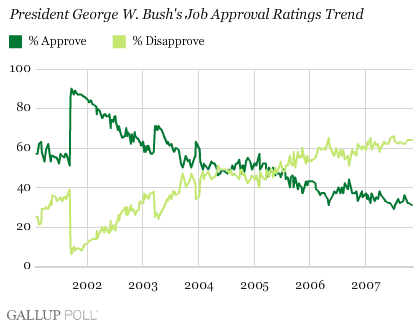President Bush And The Death Of The American DollarThe American Dollar is dying. Some would say it is already dead. China is now preparing to bail out on the American Dollar to the tune of some $1.4 trillion in reserves. They call it 'diversifying'. International money traders, privately, call China's move The Coffin. The US Dollar, of course, is the corpse in that coffin.
For years, numerous so-called 'conspiracy websites' have been warning that it has been President George W. Bush's mission to destroy the US Dollar as a world beating currency. Some theories go that the death of the Dollar will pave the way for the introduction of a new currency for all of North America - that is, including Mexico and Canada. Make of that theory what you will.
The mainstream media, naturally, has long refused to face the fact that the US Dollar under President Bush has become a dead currency. But some are now starting to hint at a grand conspiracy, mostly by highlighting just how unconcerned President Bush is by what is happening to the US Dollar, and how he insists the current Federal Reserve strategy is working when it clearly is not.
Here's
Dan Froomkin of the Washington Post, sounding the alarm, now that it's all but too late :
President Bush doesn't talk about the dollar much, but when he does, he's got exactly one thing to say about it: "We have a strong dollar policy."
It's becoming increasingly clear, however, that Bush's "strong dollar policy" is driving the greenback into the ground.
The dollar is hitting record lows this week amidst fears that the mortgage-market meltdown will spread to other parts of the economy and as the Chinese make noise about moving more of their investments into euros. But it is the underlying dynamics of the American economy -- continued massive trade deficits and a whopping national debt -- that have put the dollar in such a precarious position.
A true strong dollar policy, aimed at increasing the confidence of international investors, would require Bush to do a bunch of things he doesn't want to do. For instance, he would have to stop borrowing so much money to fund his tax cuts and his wars. He would need to encourage the Federal Reserve to raise interest rates, rather than depend on it to keep propping up the domestic economy by decreasing them. That sort of thing.
Instead, Bush just offers the strong-dollar line, without specifics, and moves on.
Consider how eager he was to drop the subject last month during a Wall Street Journal interview:
WSJ: "[T]here has been a lot of concern, obviously, about the value of the dollar around the world, and some calls for the U.S. to put more action behind its vow that we support a strong dollar. How do you respond to them, and do you think Treasury needs to intervene at all at this point?"
Bush: "Secretary Paulson, of course, is our main spokesman on this issue, and he reflects the view of this administration that the strong dollar policy is the correct policy. And we also believe that the best way for a currency to become valued is through the market."
WSJ: "That's it?"
Bush: "Yes."
The policy is for a 'strong dollar'. That's it.
Mike Whitney provides a more thorough dismantling of the shocking state of the American dollar and the financial tsunami now bearing down on the United States.
Bush wants to let "the market decide" what the US Dollar is worth.
The market has already decided. And it's beyond grim.


